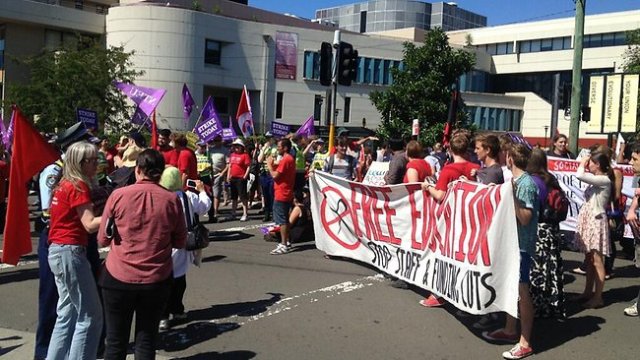
When the Murdoch-owned Australian starts attacking students who took to the streets on March 27 as part of the National Union of Students’ (NUS) protest for free education, it is evidence that student activism makes conservatives very nervous.
A March 28 article by Kylar Loussikian, which included factual inaccuracies, was scathing in its coverage of the rally — including its size and composition. It “reported” that radical socialists were among the rally organisers. They were — alongside Greens and a section of Labor students who disagree with their party’s policies on higher education.
The rally was upbeat and noisy, but involved only about 150 people. This was good considering the NUS, which is still a largely ALP-dominated student organisation, has not called for a protest with the demand for free education for some years. In fact, if it was not for left-wing political activists on campuses across Sydney, the rally wouldn’t have gone ahead.
The Australian left out a key reason the protest worked — it took place on the second day of a 48-hour strike called by the National Tertiary Education Union (NTEU) and was supported by the Community and Public Sector Union which covers some general staff. The Sydney University Education Action Group actively supported the strike, as did other community and political groups.
The NTEU has been trying to get the University of Sydney management to negotiate a new enterprise agreement since August.
The university wants to weaken job security clauses and abolish review committees, remove limits on the number of casual staff, slash sick leave and deliver a real pay cut. It also wants to remove the union’s right to bargain on behalf of the academics and general staff at the university.
Most of the students who joined the NUS-called rally — for free education, student control of their money, against the deregulation of fees and to end staff and funding cuts — had been on the picket lines around the university for a day and a half, supporting the academic and general staff in their log of claims.
Conversations on the picket lines including why the staff were having to resort to this sort of action, what could it achieve and why public education is under attack from the major parties, made the two days hugely educational experiences for staff and students alike.
There had not been a strike on that campus for 10 years, so for many students this was a new and radicalising experience. This is what the Australian was really concerned about.
Support for the rally ran high at the University of Sydney campus because so many students were supporting the NTEU strike. Students understood that supporting their teachers in their battle with management also meant supporting their own future and that of public education.
They also knew that academics supported the rally’s demands, especially its opposition to the deregulation of fees. The University of Sydney is crying poor, but currently sits on a $93 million cash surplus. The vice-chancellor and deputy vice-chancellor receive annual salaries and bonuses of more than $3 million.
It kicked off in high spirits from the Eastern Avenue picket line and by the time it arrived back from the University of Technology, it was so energised that it sat down on City Road next to Eastern Avenue to the applause of strikers and their supporters.
The protest must have been an irritant to the large number of Tactical Response Police who, over the previous day and a half, had been arresting students deemed to have “trespassed” on the campus.
It was obviously irritating to the Australian, which opined that students would benefit more from hiring a well-paid lobbyist.
The student movement seems to be re-emerging after a quiet spell. Rather than join their “real world”, as the Australian urges, students and their supporters must continue to organise against Julia Gillard’s Orwellian-named “education revolution”. This includes continuing to support their teachers and general staff in their campaign for decent workplace conditions.
Meanwhile, in the real world, the NTEU reported to its Sydney University members on April 4 that following the 48-hour strike action, management “has heard our voice and are starting to engage at the bargaining table”.